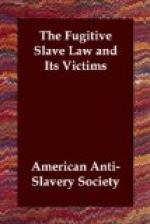children; and they were of the tribe of slaves
fleeing from a bondage which was worse than death.
There was now no escape—the tribes of Israel
had banded against them. On the side of
the oppressor there is power. And the young
wife and mother, into whose very soul the iron
had entered, hearing the cry of the master: “Now
we’ll have you all!” turning from
the side of her husband and father, with whom
she had stood to repel the foe, seized a knife,
and with a single blow nearly severed the head from
the body of her darling daughter, and throwing
its bloody corpse at his feet, exclaimed, “Yes,
you shall have us all! take that!”
and with another blow inflicted a ghastly wound upon
the head of her beautiful son, repeating, “Yes,
you shall have us all—take
that!” meanwhile calling upon her old mother
to help her in the quick work of emancipation—for
there were two more. But the pious old grandmother
could not do it, and it was now too late—the
rescuers had subdued and bound them. They
were on their way back to the house of their bondage—a
life more bitter than death! On their way through
that city of churches whose hundred spires told
of Jesus and the good Father above; on their
way amid the throng of Christian men, whose noble
sires had said and sung, “Give me liberty,
or give me death.”
But they all tarried in the great Queen City of the West—in chains, and in a felon’s cell. There our preacher visited them again and again. There he saw the old grandfather and his aged companion, whose weary pilgrimage of unrequited toil and tears was nearly at its end. And there stood the young father and the heroic wife “Margaret.” Said the preacher, “Margaret, why did you kill your child?” “It was my own,” she said, “given me of God, to do the best a mother could in its behalf. I have done the best I could! I would have done more and better for the rest! I knew it was better for them to go home to God than back to slavery.” “But why did you not trust in God—why not wait and hope?” “I did wait, and then we dared to do, and fled in fear, but in hope; hope fled—God did not appear to save—I did the best I could!"
And who was this woman? A noble, womanly, amiable, affectionate mother. “But was she not deranged?” Not at all—calm, intelligent, but resolute and determined. “But was she not fiendish, or beside herself with passion?” No, she was most tender and affectionate, and all her passion was that of a mother’s fondest love. I reasoned with her, said the preacher; tried to awaken a sense of guilt, and lead her to repentance and to Christ. But there was no remorse, no desire of pardon, no reception of Christ or his religion. To her it was a religion of slavery, more cruel than death. And where had she lived? where thus taught? Not down among the rice swamps of Georgia, or on the banks of Red River. No, but within sixteen miles of the Queen City of the West! In




